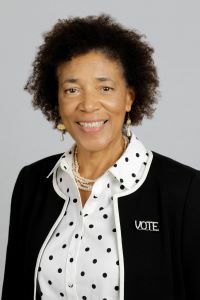
Let’s Live Our League Legacy
Presentation by Cecile Scoon, October 11, 2021
Cecile Scoon, LWVFL President, shared her vision for the State League and its 29 Local Leagues. She noted that significant minority groups in our state perceive themselves as “apart.” They neither feel welcome nor have civic engagement. It is critical that we acknowledge their experiences. We must reach out to partner with their community leaders - to bridge gaps and build past them. We must also strengthen relationships with each other, and the relationship between the State and Local Leagues. Working together on DEI and voter participation will help achieve Scoon’s vision. She then segued to voting rights and the role of redistricting.
Florida Redistricting Overview. The right to vote, based on free and fair elections, is the foundation of our democracy. Every ten years, voting district boundaries are redrawn, based on the preceding census. The way voting district boundaries are drawn can mean the difference between democracy and despotism (tyranny of the minority or the majority).
In Florida, both the state Senate and House of Representatives participate in the redistricting process. This impacts seats in the US House of Representatives, as well the Florida Senate and House for the next ten years. Due to population growth of nearly 2.7 million, Florida has added one seat to its delegation in Washington, DC. bringing its total to 28.
Florida redistricting is being discussed in Interim Legislative Committee Meetings in Fall, 2021; it will be finalized in 2022 Legislative Session that convenes on January 11, 2022. Due to Covid, the public has not been invited to these redistricting sessions. There seem to be no plans to stream future sessions.
Gerrymandering. Ideally, all districts in a state should be drawn fairly, to not disadvantage voters based on race or political viewpoint. However, in 1812 Elbridge Gerry, Governor of Massachusetts, created the practice of manipulating voting district borders to favor one party or constituency over another. When elected politicians are responsible for redistricting, it is tempting to gerrymander to retain or increase political power. Gerrymandering is also a popular voter suppression strategy in many states. Typical gerrymander tactics involve cracking (distributing minority voters across several districts to dilute their voting power) and packing (concentrating minority voters into one district, to reduce their influence in other districts).
21st Century Florida Gerrymandering. In response to rampant gerrymandering, the Florida Fair Districts Amendments were passed by 63% of voters on November 2, 2010. Amendments 5 and 6 created standards for the Florida Legislature to follow when redrawing State Senate and US Congressional districts that would be in effect for the 2012 elections. The Florida Legislature ignored these amendments and was challenged in court by Common Cause Florida and the LWVFL. After losing two decisions from the Florida Supreme Court, creating gerrymandered Congressional maps twice, and spending $8 million to prove it had not gerrymandered, the state Supreme Court approved a third map in 2015. In 2016, the Second Circuit Court in Leon
County adopted the State Senate Redistricting plan recommended by Common Cause and the LWVFL. The Legislature did not challenge this decision.
The Voting Rights Act, 1965. Section 2 of this landmark federal legislation prohibits voting practices that discriminate based on race, color or membership in a language minority group. Section 2, along with the 14th Amendment are the US Justice Department’s principal tools in 2021 to protect our right to vote. Unfortunately, much of the 1965 Voter Rights Act has been eviscerated by a series of Supreme Court decisions.
Significant 21st Century Supreme Court Decisions.
- Shelby v. Holder, 2013. Section 5 of the 1965 Voting Rights Act required jurisdictions with history of discrimination to submit proposed changes in voting procedures to the Department of Justice or a federal district court in D.C. prior to going into effect to ensure minority voters would not be harmed. The Supreme Court ruled 5-4 that Section 4b (that concerns which jurisdictions are covered by Section 5) was unconstitutional because it was based on an old formula. This meant that until updated by Congress, Section 5 is inoperable. Note: many of the 2021 voter suppression changes made by state legislatures would not have passed the requirements of Section 5.
- Rucho v. Common Cause, 2019. In a 5-4 decision, the Supreme Court ruled that partisan gerrymandering claims are not “justiciable” because they present a political question beyond the reach of the federal courts. In the absence of any limited and precise standard for evaluating partisan gerrymandering federal courts cannot resolve such issues. This means there are no federal standards to define gerrymandering.
- Brnovich v. Democratic National Committee, 2021. In a 6-3 decision, the Supreme Court narrowly interpreted Section 2 of the 1965 Voting Rights Bill making it more difficult to use Section 2 to challenge discriminatory voting laws in the future. The case concerned Arizona voting rules that discriminated against Native American, Black and Latino voters.
What Can You Do? 1). Stay informed. 2) Let your state, local and D.C. representatives know how you feel about voter suppression practices. 3) Support organizations that support legislation to protect voting rights, educate voters, increase voter participation and turnout. 4) Insist upon streaming Florida State Legislative sessions that have to do with redistricting and revising voter laws. Autocracy thrives in darkness! 5). Volunteer with LWVCC Voter Services committee to register voters, work as poll watcher and more. 6) Send letters to editor and local publications. 7) Stay motivated, positive, flexible and do whatever is needed!